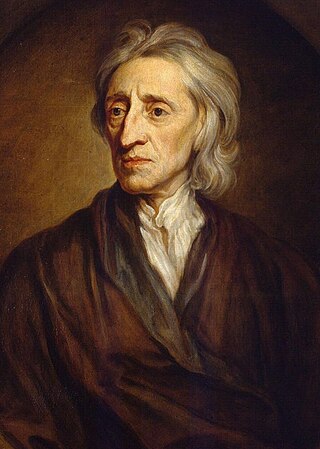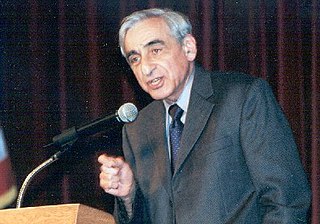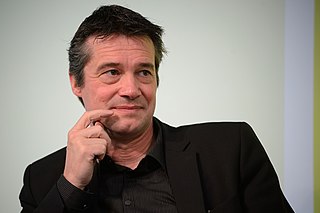
John Locke was an English philosopher and physician, widely regarded as one of the most influential of Enlightenment thinkers and commonly known as the "father of liberalism". Considered one of the first of the British empiricists, following the tradition of Francis Bacon, Locke is equally important to social contract theory. His work greatly affected the development of epistemology and political philosophy. His writings influenced Voltaire and Jean-Jacques Rousseau, and many Scottish Enlightenment thinkers, as well as the American Revolutionaries. His contributions to classical republicanism and liberal theory are reflected in the United States Declaration of Independence. Internationally, Locke's political-legal principles continue to have a profound influence on the theory and practice of limited representative government and the protection of basic rights and freedoms under the rule of law.

Charles Margrave Taylor is a Canadian philosopher from Montreal, Quebec, and professor emeritus at McGill University best known for his contributions to political philosophy, the philosophy of social science, the history of philosophy, and intellectual history. His work has earned him the Kyoto Prize, the Templeton Prize, the Berggruen Prize for Philosophy, and the John W. Kluge Prize.

"Life, Liberty, and the pursuit of Happiness" is a well-known phrase from the United States Declaration of Independence. The phrase gives three examples of the unalienable rights which the Declaration says have been given to all humans by their Creator, and which governments are created to protect. Like the other principles in the Declaration of Independence, this phrase is not legally binding, but has been widely referenced and seen as an inspiration for the basis of government.

Michael Laban Walzer is an American political theorist and public intellectual. A professor emeritus at the Institute for Advanced Study (IAS) in Princeton, New Jersey, he is editor emeritus of Dissent, an intellectual magazine that he has been affiliated with since his years as an undergraduate at Brandeis University. He has written books and essays on a wide range of topics—many in political ethics—including just and unjust wars, nationalism, ethnicity, Zionism, economic justice, social criticism, radicalism, tolerance, and political obligation. He is also a contributing editor to The New Republic. To date, he has written 27 books and published over 300 articles, essays, and book reviews in Dissent, The New Republic, The New York Review of Books, The New Yorker, The New York Times, Harpers, and many philosophical and political science journals.

A Letter Concerning Toleration (Epistola de tolerantia) by John Locke was originally published in 1689. Its initial publication was in Latin, and it was immediately translated into other languages. Locke's work appeared amidst a fear that Catholicism might be taking over England, and responds to the problem of religion and government by proposing religious toleration as the answer. This "letter" is addressed to an anonymous "Honored Sir": this was actually Locke's close friend Philipp van Limborch, who published it without Locke's knowledge.

Joseph Raz was an Israeli legal, moral and political philosopher. He was an advocate of legal positivism and is known for his conception of perfectionist liberalism. Raz spent most of his career as a professor of philosophy of law at Balliol College, Oxford, and was latterly a part-time professor of law at Columbia University Law School and a part-time professor at King's College London. He received the Tang Prize in Rule of Law in 2018.
Jean Jay Macpherson was a Canadian lyric poet and scholar. The Encyclopædia Britannica calls her "a member of 'the mythopoeic school of poetry,' who expressed serious religious and philosophical themes in symbolic verse that was often lyrical or comic."

Thomas Lee Pangle, is an American political scientist. He holds the Joe R. Long Chair in Democratic Studies in the Department of Government and is Co-Director of the Thomas Jefferson Center for Core Texts and Ideas at the University of Texas at Austin. He has also taught at the University of Toronto and Yale University. He was a student of Leo Strauss.

Rainer Forst is a German philosopher and political theorist, and was called the "most important political philosopher of his generation" in 2012, when he won the Gottfried Wilhelm Leibniz Prize. Currently he is Professor of Political Theory at the Department for Social Sciences, Goethe University Frankfurt. He is often identified with the newest generation of scholars associated with the Frankfurt School of critical theory. He received his doctorate under the supervision of Jürgen Habermas in 1993, with additional supervision by John Rawls from 1991 to 1992.
Crawford Brough Macpherson was an influential Canadian political scientist who taught political theory at the University of Toronto.
James Hamilton Tully is a Canadian philosopher who is the Distinguished Professor Emeritus of Political Science, Law, Indigenous Governance and Philosophy at the University of Victoria, Canada. Tully is also a Fellow of the Royal Society of Canada and Emeritus Fellow of the Trudeau Foundation.
Jonas Proast (c.1640−1710) was an English High Church Anglican clergyman and academic. He was an opponent of latitudinarianism, associated with Henry Dodwell, George Hickes, Thomas Hearne and John Edwards. He is now known for his controversy with John Locke, over Locke's Letter concerning Toleration.

Atheism, as defined by the entry in Diderot and d'Alembert's Encyclopédie, is "the opinion of those who deny the existence of a God in the world. The simple ignorance of God doesn't constitute atheism. To be charged with the odious title of atheism one must have the notion of God and reject it." In the period of the Enlightenment, avowed and open atheism was made possible by the advance of religious toleration, but was also far from encouraged.
Christopher Warren Morris is professor and chair of philosophy at the University of Maryland, where he is also a member of the Faculty of Politics, Philosophy, and Public Policy.
Canadian idealism is a Canadian philosophical tradition that stemmed from British idealism.
John Marshall is a British historian. He was the Chairman of the Department of History at Johns Hopkins University, and is now Leonard and Helen R. Stulman Professor of History at the same institution.
Monique Deveaux is a Canadian philosopher. She is a Full Professor and Tier 1 Canada Research Chair in Ethics and Global Social Change at the University of Guelph. She is known for her research on poverty, cultural pluralism and global justice.
Maxine Kamari Clarke is a Canadian-American scholar with family roots in Jamaica. As of 2020, she is a distinguished professor at the Centre for Criminology & Sociolegal Studies and the Centre for Diaspora & Transnational Studies at the University of Toronto. In 2021, she was named a Guggenheim Fellow.

Robert Stainton is a Canadian philosopher/linguist and Distinguished University Professor at the University of Western Ontario. He is known for his works on the philosophy of language, cognitive science/philosophy of the mind, analytic metaphysics/philosophical logic, semantics and pragmatics. He is currently leading a Social Sciences and Humanities Research Council of Canada (SSHRC) Insight Grant-funded project on The Metaphysics and Epistemology of Languages with Christopher Viger. He is also “a fanatical carp fisher,” as he told Outdoor Canada.
Morag Barbara Arneil is a Scottish-Canadian political scientist. She is a Professor of Political Science at the University of British Columbia and a Fellow of the Royal Society of Canada.









